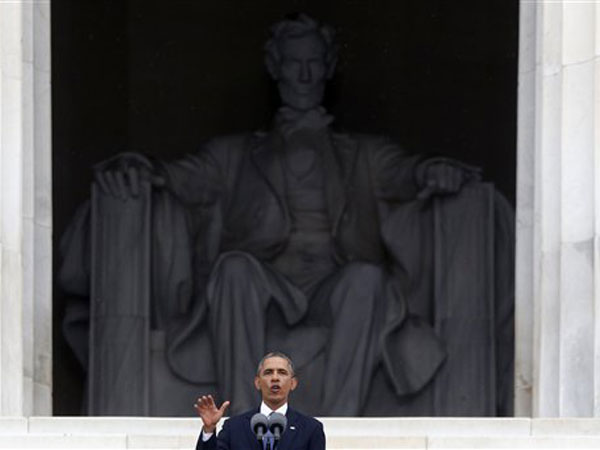Obama at 50th anniversary embodies King’s dream

President Barack Obama speaks at the 50th Anniversary of the March on Washington where Martin Luther King Jr., spoke, Wednesday, Aug. 28, 2013, at the Lincoln Memorial in Washington. AP
WASHINGTON— President Barack Obama led civil rights pioneers Wednesday in a ceremony for the 50th anniversary of the March on Washington, where Dr. Martin Luther King’s “I Have a Dream” speech roused the 250,000 people who rallied there decades ago for racial equality.
Large crowds gathered at the Lincoln Memorial, where the first black U.S. president spoke just after 1900 GMT — the same time that King delivered his spellbinding speech.
The first march was early in the turbulent 1960s, when the South still had separate restrooms, schools and careers for blacks and whites, and racism lingered across the country. In the two years following the march, President Lyndon Johnson signed the landmark Civil Rights Act and Voting Rights Act to outlaw discrimination, and King received the Nobel Peace Prize.
“There were couples in love who couldn’t marry. Soldiers who fought for freedom abroad but couldn’t find any at home,” Obama said, speaking of that era. “America changed for you and for me,” he added later.
But he pointed to the nation’s economic disparities as evidence that King’s hopes remain unfulfilled.
Article continues after this advertisement“The arc of the moral universe may bend toward justice but it doesn’t bend on its own,” Obama said, in an allusion to King’s own message.
Article continues after this advertisementThe name of that original march was the March on Washington for Jobs and Freedom.
Obama has said King is one of two people he admires “more than anybody in American history.” The other is Abraham Lincoln. Thousands of people were in attendance in wet weather.
Two former presidents, Bill Clinton and Jimmy Carter, spoke movingly of King’s legacy — and of problems still to overcome.
“This march, and that speech, changed America,” Clinton declared.
Carter said King’s efforts had helped not just black Americans, but “In truth, he helped to free all people.”
Oprah Winfrey, Forest Whitaker and Jamie Foxx were among the celebrities.
Winfrey said King forced the nation “to wake up, look at itself and eventually change.”
International commemorations were being held at London’s Trafalgar Square, as well as in the nations of Japan, Switzerland, Nepal and Liberia. London Mayor Boris Johnson has said King’s speech resonates around the world and continues to inspire people as one of the great pieces of oratory.
On Aug. 28, 1963, as King was ending his speech, he quoted from the patriotic song, “My Country ’tis of Thee” and urged his audience to “let freedom ring.”
“When we allow freedom to ring — when we let it ring from every city and every hamlet, from every state and every city, we will be able to speed up that day when all of God’s children, black men and white men, Jews and Gentiles, Protestants and Catholics, will be able to join hands and sing in the words of the old Negro spiritual, ‘Free at last, free at last, great God almighty, we are free at last,” King said.
The civil rights leader was assassinated five years later.
Not everyone at the latest march was celebrating progress. “I thought we would be a lot further along than we are 50 years after hearing King’s speech,” said John Pruitt, 83, a voter rights advocate who attended the first march as well.
Organizers of the rally broadened the focus well beyond racial issues, bringing speakers forward to address the environment, gay rights, the challenges facing the disabled and more.
Whitaker told the crowd it was their “moment to join those silent heroes of the past.”
In an interview Tuesday on Tom Joyner’s radio show, Obama said he considers the 1963 march part of his generation’s “formative memory.” A half-century after the march, he said, is a good time to reflect on how far the country has come and how far it still has to go, particularly after the recent acquittal of George Zimmerman in the fatal shooting of Trayvon Martin, an unarmed black teenager.
Race isn’t a subject Obama likes to talk about in public, but the Martin case is one time he has done so.
In the interview, Obama also said he imagines that King “would be amazed in many ways about the progress that we’ve made.” He listed advances such as equal rights before the law, an accessible judicial system, thousands of African-American elected officials, African-American CEOs and the doors that the civil rights movement opened for Latinos, women and gays.
“I think he would say it was a glorious thing,” he said.
But Obama noted that King’s speech was also about jobs and justice.
On Wednesday, King’s eldest son, Martin Luther King III, spoke on NBC of staggering unemployment among young black men.